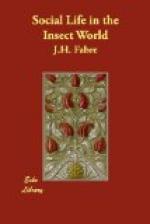“Aha!” I cried, “this is precisely the pilgrim we are waiting for. Fold your napkin and come and see what happens. We will dine later.”
Dinner was forgotten before the marvels that came to pass. With inconceivable punctuality the butterflies hastened to meet the magical call of the captive. With tortuous flight they arrived one by one. All came from the north. This detail is significant. A week earlier there had been a savage return of the winter. The bise blew tempestuously, killing the early almond blossom. It was one of those ferocious storms which in the South commonly serve as a prelude to the spring. But the temperature had now suddenly softened, although the wind still blew from the north.
Now on this first occasion all the butterflies hastening to the prisoner entered the garden from the north. They followed the direction of the wind; not one flew against it. If their guide was a sense of smell like ours, if they were guided by fragrant atoms suspended in the air, they should have arrived in the opposite direction. Coming from the south, we might believe them to be warned by effluvia carried on the wind; coming from the north in time of mistral, that resistless sweeper of earth and air, how can we suppose that they had perceived, at a remote distance, what we will call an odour? The idea of a flow of odoriferous atoms in a direction contrary to that of the aerial torrent seems to me inadmissible.
For two hours, under a radiant sun, the visitors came and went before the outer wall of the study. Most of them sought for a long time, exploring the wall, flying on a level with the ground. To see them thus hesitating you would say that they were puzzled to find the exact position of the lure which called them. Although they had come from such a distance without a mistake, they seemed imperfectly informed once they were on the spot. Nevertheless, sooner or later they entered the room and saluted the captive, without showing any great ardour. At two o’clock all was over. Ten butterflies had arrived.
During the whole week, and always about noon, at the hour of the brightest sunlight, the butterflies arrived, but in decreasing numbers. The total approached forty. I thought it useless to repeat experiments which would add nothing to what I had already learned. I will confine myself to stating two facts. In the first place, the Lesser Peacock is diurnal; that is to say, it celebrates its mating under the dazzling brilliance of noon. It needs the full force of the sunlight. The Great Peacock, on the contrary, which it so closely resembles both in its adult form and the work of its caterpillar, requires the darkness of the first hours of the night. Who can explain this strange contrast in habits?
In the second place, a powerful current of air, sweeping away in a contrary direction all particles that might inform the sense of smell, does not prevent the butterflies from arriving from a direction opposite to that taken by the effluvial stream, as we understand such matters.




